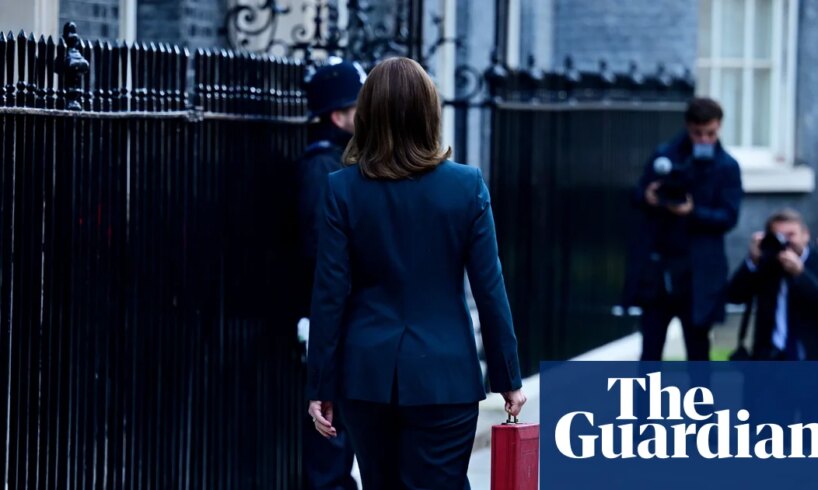
The Treasury’s independent forecaster has warned that Rachel Reeves’s tax-raising budget will still leave the public finances in a “vulnerable” position despite her more than doubling the UK’s financial buffer.
.
The Office for Budget Responsibility (OBR) said the potential for damaging events – such as a global stock market crash or future pandemic – to knock the government’s finances off course remained high, even while the chancellor increased her headroom from £9.9bn to £22bn.
After a wide-ranging review of the UK’s economic health stretching back to the 2008 financial crash, the OBR also said the economy would grow at a slower rate over the next five years than previously estimated.
The OBR said the economy would grow by 1.5% this year, an increase from its earlier 1% forecast, and by 1.4% next year, much lower than a forecast in March of 1.9%. Growth would also be lower than expected in the following three years, undermining the chancellor’s drive.
As Reeves prepared to announce £26bn of tax rises in her set-piece speech, the OBR gave its verdict on the impact of her tax and spending measures in a document accidentally released early. It quickly apologised for the error and launched an investigation, blaming a “mistake within the OBR”.
graphic showing tax receiptsgraphic showing government spending
The forecaster said the tax rises gave Reeves the funds to build a bigger financial buffer after the £16bn cost of its economic downgrade was offset by £14bn of extra income from higher tax receipts. The downgrade amounted to 0.3 of a percentage point in lost growth by 2030 compared with an estimate it made in March.
Higher annual debt financing costs and larger welfare bills were factors that increased pressure on the chancellor to raise taxes.
Richard Hughes, the chair of the OBR, emphasised the increasing vulnerability of the UK from a predicted sharp rise in borrowing over the next two years.
.
He said the £22bn buffer remained slim, and could be overwhelmed by “£60bn more debt by the end of the decade than we forecast in March, an overall debt burden which is twice the advanced-economy average, and the country continuing to pay more to service that debt than at almost any other time in its postwar history”.
“While this budget addresses some fiscal risks and increases the margin held against the government’s fiscal targets, it still leaves the UK public finances relatively vulnerable to future shocks,” the OBR said.
Government spending would increase in each of the next five years, adding £11bn in 2029-30, Hughes said.
Ruth Curtice, the chief executive of the Resolution Foundation thinktank, described the budget as a “repair job” that left much of the pain from higher tax rises to 2028 and beyond.
Helen Miller, the director of the Institute for Fiscal Studies, called it a “spend now, pay later” budget that backdated most of the tax rises to the end of the parliament.
The OBR chair, Richard Hughes – seen here exiting Downing Street after Liz Truss’s mini-budget in September 2022 – said Reeves’s £22bn buffer remained slim. Photograph: Charlie J Ercilla/Alamy
Reeves has relied on a three-year extension to a longstanding freeze on income tax thresholds to close much of the spending gap that arose from higher spending and the downgrade in growth.
Often dubbed a stealth tax, the freeze pushes more people on low incomes into the standard rate tax band and existing taxpayers into the higher rate bands. The OBR said the move would raise an extra £8.3bn in 2029-30.
The OBR said consumers would face inflation of 3.5% this year, higher than the 3.2% forecast in March, and 2.5% next year, higher than the 2.1% previously forecast, before settling at 2%.
skip past newsletter promotion
Sign up to Business Today
Get set for the working day – we’ll point you to all the business news and analysis you need every morning
Privacy Notice: Newsletters may contain information about charities, online ads, and content funded by outside parties. If you do not have an account, we will create a guest account for you on theguardian.com to send you this newsletter. You can complete full registration at any time. For more information about how we use your data see our Privacy Policy. We use Google reCaptcha to protect our website and the Google Privacy Policy and Terms of Service apply.
after newsletter promotion
The government was likely to see a boost from “sticky inflation” which would keep prices increasing above 2% for longer than expected, the OBR added, boosting VAT tax receipts and income tax from higher wages.
The OBR said the overall tax take would jump to a historically high level of 38% as a proportion of national income.
.
It added that the extra spending in the first years of the forecast would send borrowing on a rollercoaster ride once higher taxes in the latter years, married to tough spending limits, took effect.
“The net impact of budget spending and tax policies increases borrowing by £5bn on average over the next three years but then reduces it by £13bn on average in the following two,” the OBR said.
Among the many smaller tax rises will be a clampdown on salary sacrifice schemes that allow tax-free pension contributions from April 2029, raising £4.7bn for the Treasury in the 2029-30 financial year.
The chancellor said she was increasing taxes on wealth by £8bn, including an annual “mansion tax” on homes worth more than £2m, expected to raise £400m annually from April 2028.
.
When all tax and spending measures are included, the OBR said borrowing was expected to fall from 4.5% of national income in 2025-26 to 1.9% of national income in 2030-31.
Debt interest would account for £1 in every £10 of government spending in this financial year, Reeves said, but the ratio of debt to national income would begin to fall in 2029-30 and again in 2030-31.
Earlier this year, the OBR signalled that it would be conducting a review in time for this budget of the UK’s outlook for productivity, which measures the output of the average worker per hour.
The outcome of the review reduced the chancellor’s headroom by £16bn from £9.9bn to -£4bn, less than the £20bn downgrade expected by many analysts.
Rob Wood, the chief UK economist at the consultancy Pantheon Macroeconomics, said: “Despite the positive spin from the chancellor today, the fiscal outlook remains perilous. Some of the fiscal savings will fail to materialise; the government seems to lack the political power to push through measures necessary to stabilise the fiscal ship in the near term, and we think defence spending will place further pressure on the sums.”
When asked whether he would resign over the OBR leak if asked to, Hughes said: “I will abide by [the investigation’s] recommendations.”
The OBR also noted concerns over an AI-driven bubble in stock markets. “While market turbulence is hard to anticipate, a large global equity price correction poses a downside risk to both our economy and fiscal forecast,” it said.




